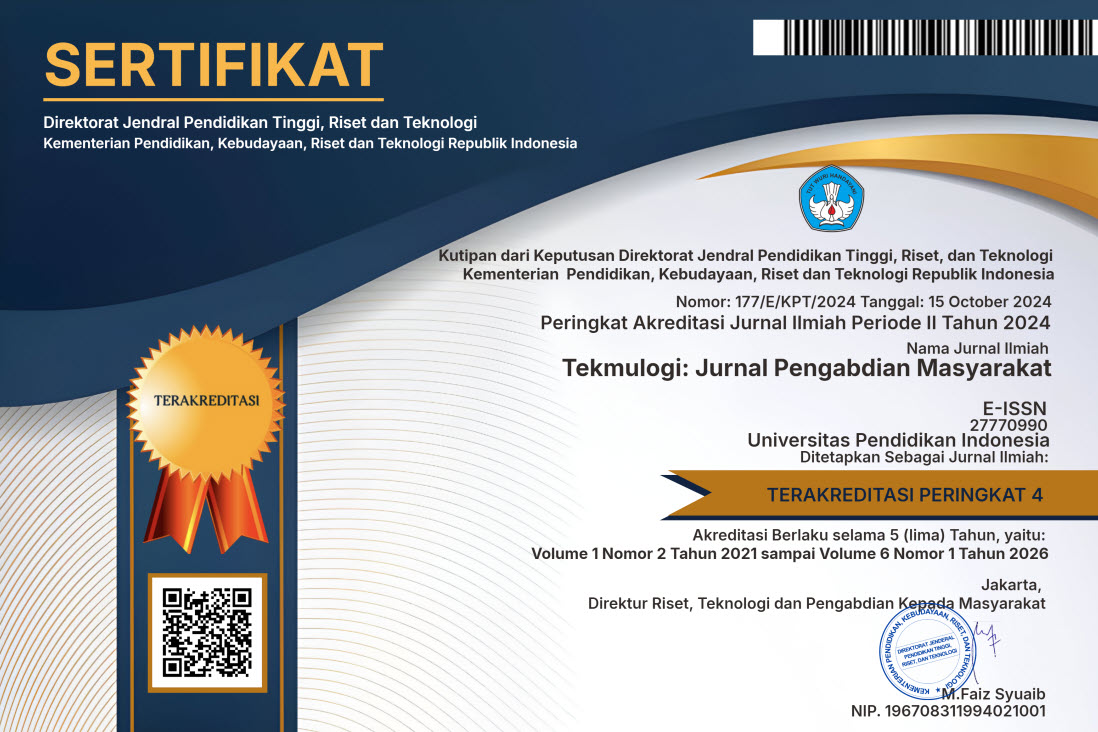Training development of instructional design teaching materials based educational robots with ADDIE method in SMP Negeri 1 Baleendah
Abstract
Keywords
Full Text:
PDFReferences
Agustianingsih, R., and Mahmudi, A. (2019). How to design open-ended questions? : Literature review. Journal of Physics: Conference Series, 1320(1).
Ariani, D. (2020). Pengembangan Lembar Kerja Peserta Didik (LKPD) Berbasis Discovery Learning pada materi Kalor di SMP. In Fakultas Tarbiyah Dan Keguruan Universitas Islam Negeri Ar-Raniry Darussalam-Banda Aceh.
Briggs, L. J. (1991). Instructional Design: Principles and Applications. Educational Technology.
Cervera, N., Diago, P. D., Orcos, L., and Yáñez, D. F. (2020). The acquisition of computational thinking through mentoring: An exploratory study. Education Sciences, 10(8), 1–11.
Cheung, L. (2016). Using the ADDIE Model of Instructional Design to Teach Chest Radiograph Interpretation. Journal of Biomedical Education, 2016, 1–6.
Donmez, M., and Cagiltay, K. (2016). A review and categorization of instructional design models. E-Learn: World Conference on E-Learning in Corporate, Government, Healthcare, and Higher Education. Washington, DC, United States, November 14-16, November 2016, 370–384.
Gagné, R. M. (1965). The Learning of Concepts. The School Review, 73(3), 187–196.
Hadi Soekamto. (2020). Panduan Penyusunan Lembar Kegiatan Peserta Didik (LKPD). Sistem Pengelolaan Pembelajaran Universitas Negeri Malang, February, 7.
Hamidah, N., Haryani, S., dan Wardani, D. S. (2018). Efektivitas Lembar Kerja Peserta Didik Berbasis Inkuiri Terbimbing Untuk Meningkatkan Hasil Belajar Siswa. Jurnal Inovasi Pendidikan Kimia, 12(2), 2212–2223.
Kemendikbudristek BSKAP. (2022). Capaian Pembelajaran Pada Pendidikan Anak Usia Dini, Jenjang Pendidikan Dasar, Dan Jenjang Pendidikan Menengah Pada Kurikulum Merdeka. In Keputusan Kepala Badan Standar, Kurikulum, Dan Asesmen Pendidikan Kementerian Pendidikan, Kebudayaan, Riset, dan Teknologi NOMOR 008/H/KR/202 (pp. 1–384). Kemendikbudristek.
Molenda, M. H. (2022). History and Development of Instructional Design and Technology. In Handbook of Open, Distance and Digital Education (pp. 1–18). Springer Singapore.
Nurhopipah, A., Suhaman, J., dan Humanita, M. T. (2021). Pembelajaran Ilmu Komputer Tanpa Komputer (Unplugged Activities) Untuk Melatih Keterampilan Logika Anak. JMM (Jurnal Masyarakat Mandiri), 5(5), 2603–2614.
Nurmuslimah, H. (2019). Peningkatan Prestasi Belajar Siswa pada Mata Pelajaran Matematika Menggunakan Pendekatan Soal Berbasis Kebudayaan Islam dan Computational Thinking. Prosiding Seminar Nasional Integrasi Matematika Dan Nilai Islami, 3(1), 78–84.
Ozdilek, Z., and Robeck, E. (2009). Operational priorities of instructional designers analyzed within the steps of the Addie instructional design model. Procedia - Social and Behavioral Sciences, 1(1), 2046–2050.
Pratama, R. A., and Saregar, A. (2019). Development Of Students‟ Work Sheets (LKPD) Based On Scaffolding To Train Concept Understanding. Annals of Tourism Research, 3(1), 1–2.
Putra, A., Syarifuddin, H., dan Zulfah, Z. (2018). Validitas Lembar Kerja Peserta Didik Berbasis Penemuan Terbimbing dalam Upaya Meningkatkan Pemahaman Konsep dan Kemampuan Penalaran Matematis. Edumatika : Jurnal Riset Pendidikan Matematika, 1(2), 56.
Robert, G. (1966). Training Research and Education. Journal of Research in Science Teaching, 4(2), 124–124.
Sala-Sebastià, G., Breda, A., Seckel, M. J., Farsani, D., and Alsina, À. (2023). Didactic–Mathematical–Computational Knowledge of Future Teachers When Solving and Designing Robotics Problems. Axioms, 12(2).
Sari, A. N., Gelar, T., Hayati, H., Hakim, L., Hodijah, A., dan Riza, M. (2024). Pelatihan Pembelajaran Computational Thinking Untuk Guru SMP 1 Negeri Baleendah. Jurnal Abdimas TGD, 4(1), 50–61.
Seckel, M. J., Salinas, C., Font, V., and Sala-Sebastià, G. (2023). Guidelines to develop computational thinking using the Bee-bot robot from the literature. Education and Information Technologies, 0123456789.
Selmin, Y., Bunga, Y. N., dan Bare, Y. (2022). Pengembangan Lembar Kerja Peserta Didik (Lkpd) Berbasis Inkuiri Terbimbing Materi Sistem Organisasi Kehidupan. Spizaetus: Jurnal Biologi Dan Pendidikan Biologi, 3(1), 41.
Sugiyanto, Y., Hasibuan, M. H. E., dan Anggereni, E. (2018). Pengembangan Lembar Kerja Peserta Didik (LKPD) Berbasis Kontekstual Pada Materi Ekosistem Kelas VII SMPN Tanjung Jabung Timur. Edu-Sains: Jurnal Pendidikan Matematika Dan Ilmu Pengetahuan Alam, 7(1), 23–33.
Van Der Meulen, A., Hartendorp, M., Voorn, W., and Hermans, F. (2023). Observing the computational concept of abstraction in blind and low vision learners using the Bee-bot and Blue-bot. Computer Science Education, 34(4), 806–828.
Wandari, A., Kamid, K., dan Maison, M. (2018). Pengembangan Lembar Kerja Peserta Didik (LKPD) pada Materi Geometri berbasis Budaya Jambi untuk Meningkatkan Kreativitas Siswa. Edumatika : Jurnal Riset Pendidikan Matematika, 1(2), 47.
Welch, L. E., Shumway, J. F., Clarke-midura, J., and Lee, V. R. (2021). Using coding toys to understand equality. 26(3), 21–26.
Widodo, S. (2017). Pengembangan Lembar Kegiatan Peserta Didik (LKPD) berbasis Pendekatan Saintifik untuk Meningkatkan Keterampilan Penyelesaian Masalah Lingkungan Sekitar Peserta Didik di Sekolah Dasar. Jurnal Pendidikan Ilmu Sosial, 26(2), 189.
Wiranata, R. A., dan Sujana, I. W. (2021). Pengembangan Lembar Kerja Peserta Didik Berbasis Pemecahan Masalah Kontekstual Materi Masalah Sosial Kelas IV SD. Jurnal Pedagogi Dan Pembelajaran, 4(1), 30.
DOI: https://doi.org/10.17509/tmg.v4i2.75992
Refbacks
- There are currently no refbacks.

This work is licensed under a Creative Commons Attribution-ShareAlike 4.0 International License.
Tekmulogi: Jurnal Pengabdian Masyarakat,
(e-ISSN:2777-0990 | p-ISSN:2777-1199) published by Universitas Pendidikan Indonesia, Kampus UPI di Cibiru.
Indexed by.





